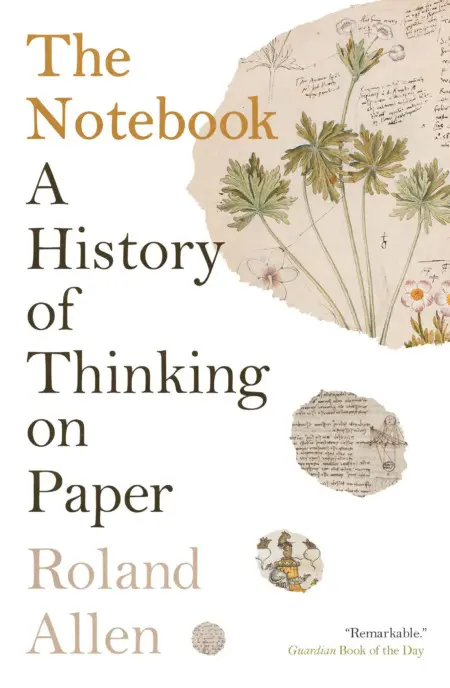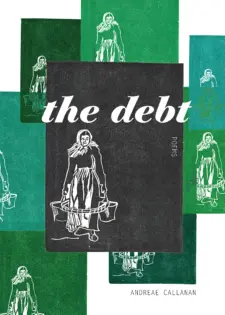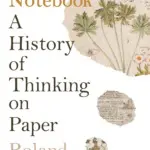Description
A Globe 100 Best Book of 2024 • A New Yorker Best Book of 2024 • A Kirkus Most Anticipated Book of Fall 2024
The first history of the notebook, a simple invention that changed the way the world thinks.
We see notebooks everywhere we go. But where did these indispensable implements come from? How did they revolutionize our lives? And how can using a notebook help change the way you think? In this wide-ranging history, Roland Allen reveals how the notebook became our most dependable and versatile tool for creative thinking. He tells the notebook stories of Leonardo and Frida Kahlo, Isaac Newton and Marie Curie, and writers from Chaucer to Henry James; shows how Darwin developed his theory of evolution in tiny pocket books and Agatha Christie plotted a hundred murders in scrappy exercise books; and introduces a host of cooks, kings, sailors, fishermen, musicians, engineers, politicians, adventurers, and mathematicians, all of whom used their notebooks as a space to think—and in doing so, shaped the modern world.
In an age of AI and digital overload, the humble notebook is more relevant than ever. Allen shows how bullet points can combat ADHD, journals can ease PTSD, and patient diaries soften the trauma of reawakening from coma. The everyday act of moving a pen across paper, he finds, can have profound consequences, changing the way we think and feel: making us more creative, more productive—and maybe even happier.
Praise for The Notebook: A History of Thinking on Paper
“The book is a revealing document of a relationship so intimate as to be sacred: that of the writer and the page. It’s a reminder that note-taking is an act of noticing, of being present and showing up to the blank paper, again and again, and discovering what may arise there.”
—Wilson Wong, New York Times
“The British publisher’s ode to notebooks is a delight for all those who love paper. For those who don’t, it’s still a worthy and enlightening read, since, as Allen explains, the notebook is a technology that has had ‘tangible effects on the world around us.'”
—Globe and Mail, The Globe 100
“Allen does not disappoint. The book tells the fascinating stories of notebooks, from the very first notebook . . . to the contemporary Bullet Journal Method, which helps users track and organize tasks. Eye-opening.”
—Julie Rak, Globe and Mail
“Allen’s narrative moves fluidly as he recounts the evolution of the notebook’s use—touching on medieval trading routes and contemporary artist studios—and explores its role in both mundane tasks and world-changing innovations.”
—New Yorker
“Bold and thrilling . . . informative and uplifting, The Notebook may leave you feeling that you should chuck away your smartphone, pick up a nice, clean journal and start jotting.”
—Wall Street Journal
“Like the many examples it covers, Allen’s history of the notebook both instructs and entertains.”
—Michael Dirda, Washington Post
“Roland Allen has really chased the notebook everywhere it has gone in civilization . . . The history’s far-flung subtopics and divagations are arranged chronologically, and they all benefit from Allen’s unerring ear for the memorable anecdote. So the overall feel of reading a single narrative holds throughout, since the book has two through lines: the notebook itself in all its varying contexts, and the consistently engaging style of the author.”
—The New Criterion
“Ranging from thirteenth-century Florence to twenty-first-century Florida, Allen’s account is a delightful mix of material and intellectual history.”
—The New Criterion
“As an intimate repository for thought, notebooks, Allen amply shows, are essential. An enthusiastic, informative cultural history.”
—Kirkus Reviews (starred review)
“As Roland Allen makes abundantly clear in his new book, The Notebook: A History of Thinking on Paper, one reason for the notebook’s continued success has been its remarkable functionality.”
—Dave McGinn, Globe and Mail
“Let me also say that every time I leafed through The Notebook: A History of Thinking on Paper, I landed on a fascinating story.”
—Kassie Rose, The Longest Chapter
“I LOVED this book. We don’t really think of notebooks and journals as a piece of technology, but of course, they are—there were dark days before such wonderful things existed.”
—Ryan Holiday, Daily Stoic
“Moving and inspiring. You should pick up this book if you have any interest in notetaking, knowledge management, creativity, productivity, thinking, the human mind, or history, because the notebook has been and continues to be integral to all of those to a degree I didn’t truly appreciate until I read it myself.”
—Tiago Forte, author of The PARA Method and Building a Second Brain
“Allen’s history of thinking on paper is a compelling exploration of human evolution itself. It’s a timely reminder of what technology can be: a way to bring us closer to each other, and ourselves.”
—Ryder Carroll, Bullet Journal founder and author of The Bullet Journal Method
“I loved this book. It was a five star read for me. Each chapter was about a completely different subject all tied together by the notebooks that are used.”
—Based on a True Story
“I was intrigued by The Notebook: A History of Thinking on Paper by Roland Allen, which traces the material and cultural history of the notebook as an object. A publisher and diarist himself, Allen has an intimacy with notebooks; he says writing a diary makes one happy and creative.”
—Deccan Herald
“Remarkable . . . Allen points to evidence that maintaining a notebook with pen and paper is best for processing and retaining information. It can stave off depression and act as ballast to those struggling with ADHD. It is tactile, a form of ‘embodied cognition’, another example of the superiority of slowness . . . paying attention, caring, handwriting: this is love.”
—Guardian Book of the Day
“[A] restless, arresting new history of the notebook . . . packed with a wonderful range of insights and anecdotes . . . [Allen] has written a fine book on a fabulous subject.”
―Daily Telegraph
“The fascinating stories [The Notebook] tells certainly make you want to take out a pen and jot down a few points . . . Allen considers the notebook in its various forms, from the wax tablet to the electronic spreadsheet, and from early modernity to the present day . . . his writing has the lightness of touch needed to turn the dry pages of notebooks into living historical documents.”
―Spectator Books of the Year
“I’m something of a notebook addict. Now I know I’m not alone, as Roland Allen makes clear in his fascinating study of notebooks through history . . . Moleskine users will love this wide-ranging history of an everyday object: it is beautifully written and a complete delight to dip in to or read from cover to cover. A lovely book.”
—New Statesman Books of the Year
“Allen is a relaxed and amusing guide . . . although he professes to be concerned mainly with notebooks’ practical applications, he is a philosopher by stealth, keen to make the reader question where the mind stops and the rest of the world begins.”
—TLS
“Surprisingly revealing.”
—The Times
“Thinking about notebooks caused Roland Allen to wonder about their connection to creativity, culture and industry; what they could tell us about their owners; why keeping a diary brought contentment, and why the longhand form has survived the digital . . . A different, fascinating, entertaining, witty approach to writing cultural history.”
—The Irish Times
“Allen takes us on an upbeat and stimulating journey . . . a celebration of intimacy in various guises.”
—Sydney Morning Herald
“Notebooks have long provided a place for us to record our activities and creativities. So shows this enthralling cultural history, which shows how the act of noting things down has shaped the world for centuries.”
—The Bookseller
“Allen’s history also demonstrates how essential the human act of recording observations is . . . A delight to read, The Notebook is a reminder of our most vital tool.”
—The Idler
“Fluently and engagingly written.”
—The Art Newspaper
“A book to savour.”
—Country Life









